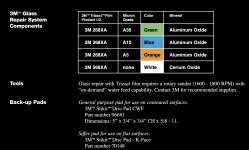Michael Kellough
Member
Which abrasive scratched the glass?
Not sure where I got the idea that aluminum oxide wouldn’t scratch glass. Is that true or false?
Not sure where I got the idea that aluminum oxide wouldn’t scratch glass. Is that true or false?

